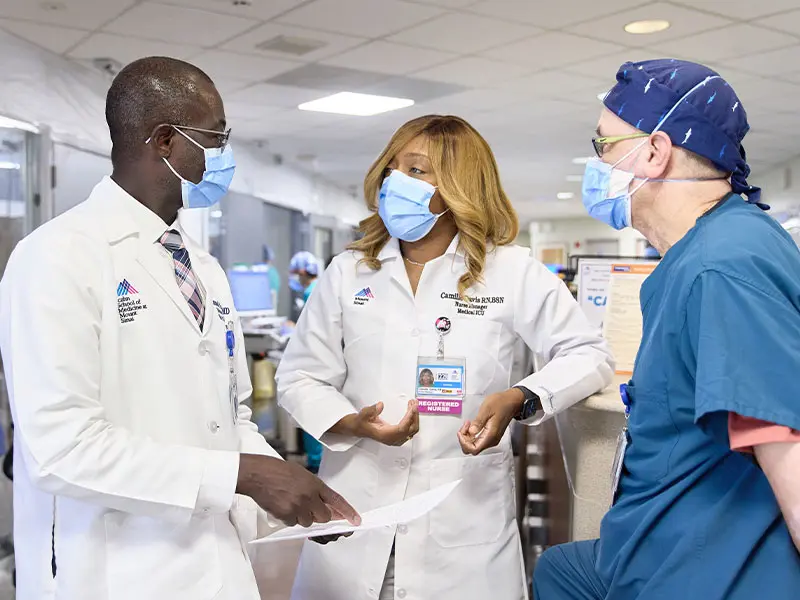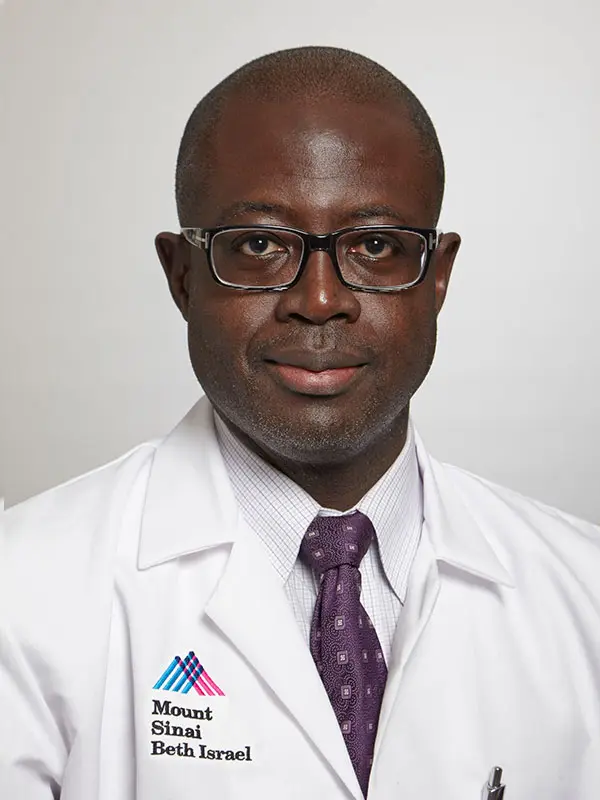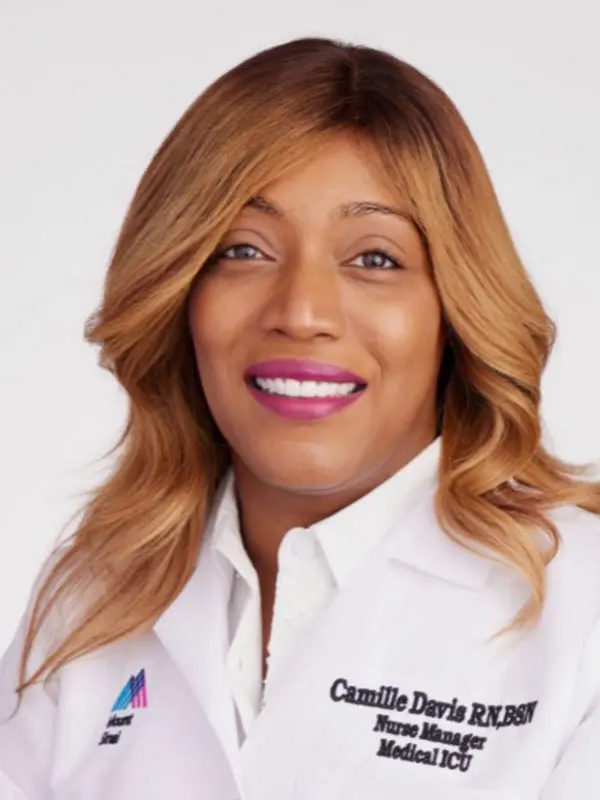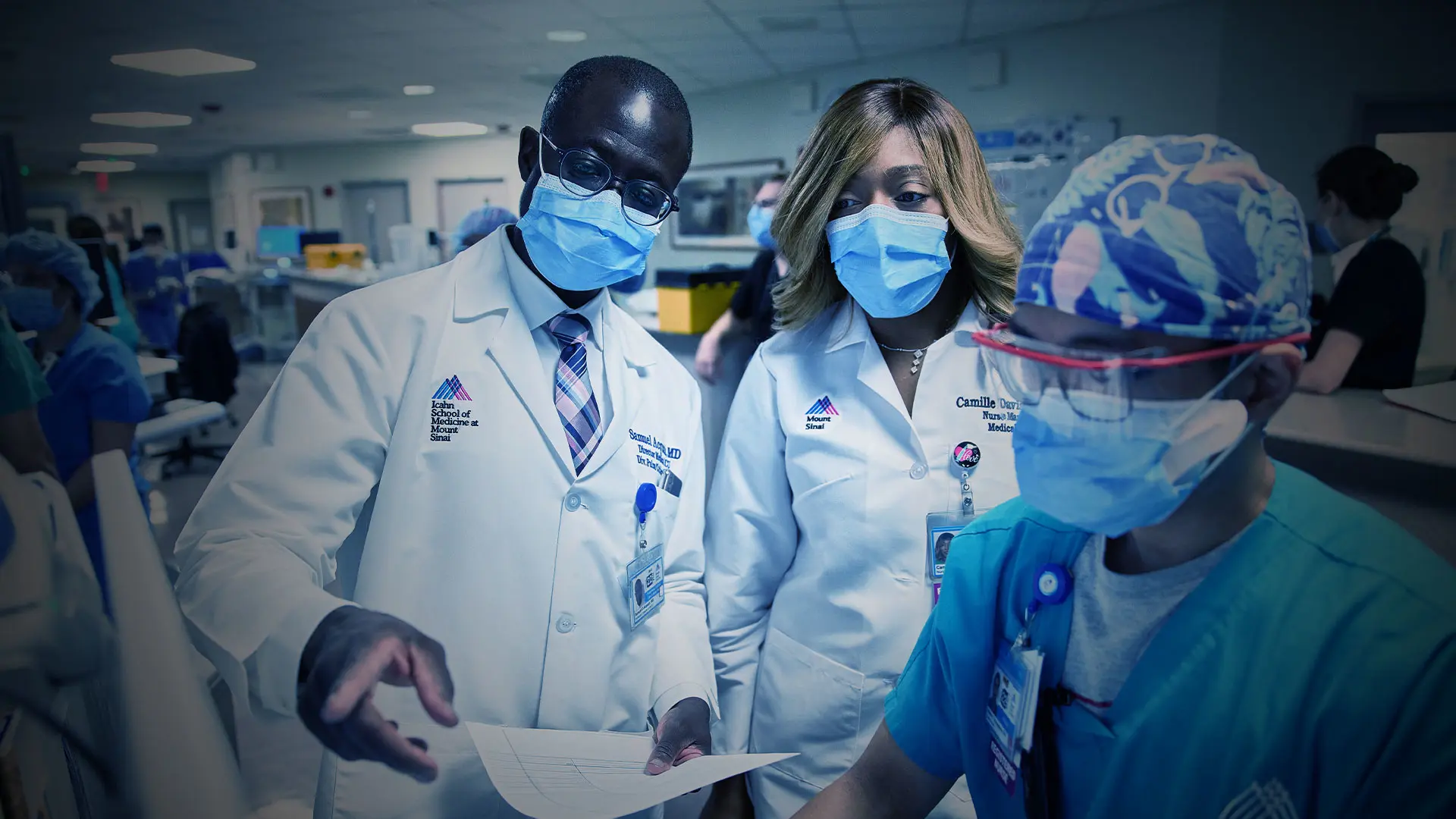Although he has more than three decades of experience in managing health care crises, Samuel Acquah, MD, cannot recall anything that remotely matched the rapidity or the severity of the first wave of the COVID-19 pandemic and its impacts on the medical intensive care unit (MICU) at The Mount Sinai Hospital.
“It was very difficult for the team—not just seeing so many patients coming in, but also realizing that there was nothing they could do to save some of them despite their training,” recalls Dr. Acquah, Director of the MICU, and Professor of Medicine (Pulmonary, Critical Care and Sleep Medicine) at the Icahn School of Medicine at Mount Sinai. “There was added stress because our lives were constantly at risk. This was a new disease and the protocols that were intended to protect us changed every day.”
During that initial surge, the MICU’s 14 single-patient rooms became double-patient rooms, necessitating makeshift monitors and the placement of intravenous poles outside the rooms to maximize space. The MICU’s two-to-one patient-to-nurse ratio became a three-to-one ratio just to keep pace.
Although the MICU team rose to these challenges during this and each subsequent surge, it was clear to Dr. Acquah that the demands of managing hundreds of cases took their toll on his colleagues. It was a reminder that the well-being of those providing care is fragile at times like these, and it served as the impetus for changes to ensure that the team had access to all the necessary mental health and social supports to effectively manage a crisis of this magnitude.
This commitment to enhancing well-being is evident in several efforts to build stronger bonds between MICU team members. Some have been social in nature, such as Better Together gatherings, held in person at the hospital, which enable the team to connect and chat with the added protection of COVID-19 safety protocols, and nurse-organized events to celebrate personal milestones, including engagements, marriages, and new babies. Other undertakings have fostered ties in unique ways, such as a MICU cookbook project that is compiling quick, simple, and healthful meal recipes from staff.
Building resilience and enhancing well-being through workshops, social events, and even a cookbook
But the initiatives focused on building resilience among MICU team members and addressing their day-to-day challenges are the ones that have been the most impactful. Access to Mount Sinai resources such as the Center for Stress, Resilience, and Personal Growth (CSRPG) has been especially beneficial, resulting in timely workshops focused on topics such as realistic optimism, self-care, spirituality, social justice, and mental health awareness. The Center has also created a safe space in a former waiting room for the team to share thoughts, ideas, and feelings to ensure that these efforts are addressing issues such as well-being, violence by patients and families against health care workers, and post-traumatic stress disorder.
“The workshops in particular have encouraged team members to look at how they and their colleagues handle situations when they are stressed, and how to avoid problematic coping strategies such as drinking or outbursts in the unit,” says Camille Davis, BSN, RN, a MICU nurse manager at The Mount Sinai Hospital. “Of all the actions we have implemented, I believe this is the most important one we are offering our team.”
Daily team huddles have also evolved, going beyond patient case discussions to explore topics such as mental health, poor patient outcomes, and availability of support services. “During the pandemic, our huddles became important touchpoints to connect with team members about how they are doing, and we have maintained that focus to ensure their needs are being met,” Dr. Acquah says.

Samuel Acquah, MD; Camille Davis, BSN, RN; and Eddie Valentin, BSN, RN, on the medical intensive care unit at The Mount Sinai Hospital
This is the new normal for the MICU team—more support services and more ways to feel connected. Meanwhile, a new normal has emerged for the team’s approach to patient care. Every patient admitted to the MICU is managed as if they have a transmissible disease, for the protection of both staff and other patients. Extracorporeal membrane oxygenation is being used to achieve improved outcomes among patients with life-threatening respiratory failure.
Approaches to proning have also been modified for patients experiencing acute respiratory distress syndrome. Prior to the pandemic, the team used a specialty proning bed before shifting to the patented prone positioning system, which offered a more economical approach. That system has been replaced by the “burrito” method, which uses pillows and sheets to bundle up the patient for safe, easy repositioning from their back to their abdomen. Additional proning protocols ensure the patient’s skin is protected at all the common pressure points.
Perhaps the biggest change in approach to patient care has occurred in the MICU visitation protocols. Pre-pandemic, families enjoyed 24-hour access and the option to participate in patient rounds to facilitate the healing process. Visitations were eliminated altogether during the pandemic, but new protocols allow patients two visitors each day between 10 am and 6 pm, with some flexibility for critical or end-of-life cases.
“The return of visitations has increased stress among the team,” Ms. Davis says. “As empathetic as we are to the needs of our visitors, we must ensure that safety is our top priority. We try to compassionately address what families are experiencing through our visitation protocols while facilitating an understanding and adherence to policy.” She adds that CSRPG resources and huddles have been invaluable in addressing related team concerns and building resilience.
As the MICU navigates this new normal, the likelihood of a future crisis, and how to prepare for it, remains on Dr. Acquah’s and Ms. Davis’s minds. They want to use all resources available at Mount Sinai and create additional strategies to increase cohesion and collaboration across teams. They are also interested in expanding and strengthening the supports that are available to the team to help them manage crises.
“We need to focus on those who provide care in stressful times because they also need care and treatment,” Ms. Davis says. “We are not machines. We want to do right by our patients. But to do that, we are putting practices in place that enable us to deliver exceptional care in the event of another unanticipated crisis.”
Featured

Samuel Acquah, MD
Director of the MICU, and Professor of Medicine (Pulmonary, Critical Care and Sleep Medicine)

Camille Davis, BSN, RN
MICU Nurse Manager
